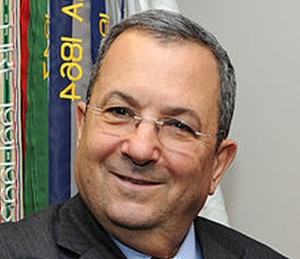“I would hope that Netanyahu seizes this opportunity to cultivate closer relations and greater coordination with the current Obama administration, but he’s not doing that.”
 Kochav Yair, December 4, 2017 – Former Prime Minister and Former Minister of Defense Ehud Barak continued his latest attempt at a political comeback this week by giving a series of interviews in which he stuck to his prediction that embattled Syrian President Basher Assad will not last more than a month into 2012.
Kochav Yair, December 4, 2017 – Former Prime Minister and Former Minister of Defense Ehud Barak continued his latest attempt at a political comeback this week by giving a series of interviews in which he stuck to his prediction that embattled Syrian President Basher Assad will not last more than a month into 2012.
Barak, 75, last held political office in 2012 in a unity government with Prime Minister Binyamin Netanyahu, who has won reelection twice since then. Barak, however, was forced out of the Labor Party leadership and has since embarked on an effort to unseat Netanyahu, a feat he managed to achieve only once, in 1999. The former premier and minister holds the honor of Israel’s most decorated soldier, and relies on the military gravitas that provides will lend credibility to his prediction that the Syrian leader will fall almost six years ago.
“It is only a matter of time, given how weak his position has become,” intoned Barak, whose premiership saw the outbreak of the Second Intifada, in which more than a thousand Israelis were killed. “What has become clear to me and to anyone else with a head on his shoulders is that Israel should position itself to take advantage of this eminently foreseeable development, or at least to protect its interests. Unfortunately, the current leadership has demonstrated it is only interested in holding on to power, and the small matter of knowing what’s actually going on in the region and doing something about it lies beyond its area of awareness and competence.”
Barak suggested that Israel work with other regional and global powers such as Turkey, the U.S., and Russia, to keep Iran from exploiting the inevitable power vacuum that Assad’s imminent fall will bring. “We cannot afford, in 2017, to stand idly by while Iran creates a Shiite corridor to the Mediterranean,” he argued. “With a friendly US administration in the White House, one that sees eye-to-eye with Israel’s leadership, that should be easier than it would be with others in power in Washington. I would hope that Netanyahu seizes this opportunity to cultivate closer relations and greater coordination with the current Obama administration, but he’s not doing that. I will,” he vowed.
“By the time 2016 comes we can reshape the whole Middle East and eliminate all manner of strategic threats,” he predicted. “The Israeli electorate, I’m sure, understands as I do, that Bibi is not the man who can navigate us through that fraught period. It’s a shame, especially with the surefire prospect of a friendly Democrat in the White House.”
Please support our work through Patreon.




